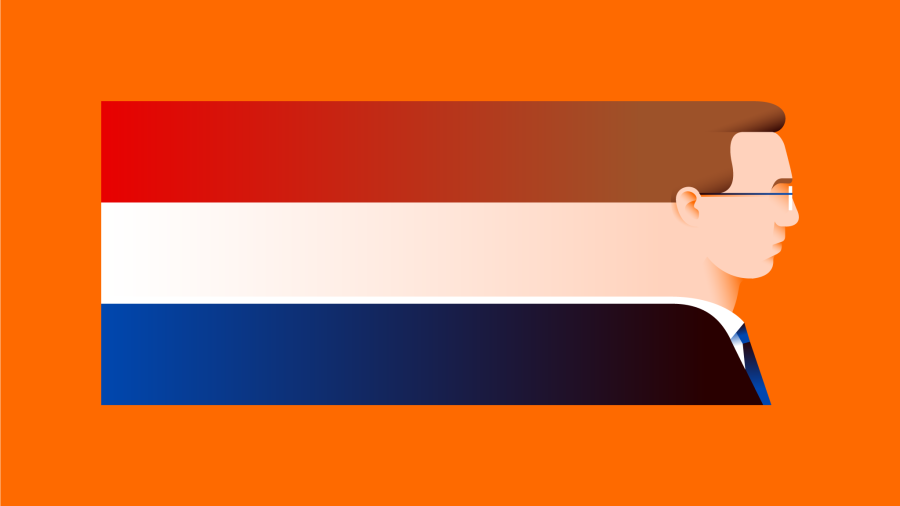[ad_1]
Ask Dutch people about Mark Rutte, their prime minister since 2010, and they recite the ritual Dutch paean to any hero who remains “normaalâ€: how the eternal bachelor lives in an ordinary flat, having refused to move into the official residence; how he doesn’t even have a coffee machine, just a kettle; how he cycles to work, teaches social studies once a week at a high school in an immigrant neighbourhood of The Hague and, finally, has no noticeable political beliefs. Rutte himself, a Germanophile, likes to quote the late West German chancellor Helmut Schmidt: “Anyone having visions should see a doctor.â€
Next week, in an election spread over three days to permit social distancing, Rutte will almost certainly keep his job. His centre-right VVD party is predicted to win about a quarter of the vote, a mammoth proportion in a splintered system where 15 parties are expected to win seats in parliament.
When German chancellor Angela Merkel steps down in September after 16 years in power, Rutte should become the EU’s longest-serving head of government after Hungary’s Viktor Orbán. What does it say about the Netherlands (the country where I grew up) that it keeps electing this “man without qualities�
To answer that question requires taking one’s eye off the sideshow of the Dutch far-right. On the rare occasions when foreigners notice the country’s politics, they understandably get diverted by the two rival nativist leaders, Geert Wilders and Thierry Baudet. But 20 years after hitting the big time, the Dutch far-right isn’t growing and has never polled above 17 per cent in a general election. Next week, Wilders and Baudet (his party reeling from racism scandals and narcissism) are forecast to score about that figure combined.
Angry voters are a minority in a country that’s usually near the top of global happiness rankings. In the quarterly survey of the national mood by the state’s Sociaal Cultureel Planbureau, Dutch people typically award their own lives an average grade of 7.8 out of 10 – which, by the criteria of Dutch schools, means “goodâ€. Even during the pandemic, the figure is still 7.2.
The standard Dutch response in wellbeing surveys is, “I’m doing fine, the country’s doing badly.†People complain about schools, migration, antisocial behaviour etc but levels of trust are high.
The contented majority spreads its vote among many technocratic centrist parties. The PM – traditionally, a tall white man – is then required to organise the coalition. Rutte is preternaturally suited to the role. “Markâ€, as even most of his civil servants call him, started out as an HR manager at Unilever and he remains an HR manager at heart, always taking rival politicians out for Indonesian dinners. Bar his occasional temper tantrums, for which he swiftly apologises, he’s a cheerful fellow.
Governing by text message, he absorbs intelligence nonstop. Free of ideology, he can work with anyone. His first coalition, from 2010 to 2012, was backed from parliament by Wilders. Rutte has since allied with centre-left and centre-right.
He makes plenty of missteps. He has overseen a string of scandals, culminating in the “benefits affairâ€: blameless people receiving aid for childcare were persecuted by bureaucrats for supposedly defrauding the state. Many victims were of immigrant origin. Rutte has form: in 2007, a court found him guilty of “discrimination†during his time as junior minister for having focused investigations of benefit fraud on Somali immigrants.
When the new “benefits affair†climaxed in January, Rutte cycled to the king to hand in his government’s resignation. But his party immediately bounced in the polls. He then resumed his mediocre management of the pandemic, including a leisurely vaccine rollout. The consensual Dutch system grinds slowly.
Rutte isn’t a brilliant manager, but his voters like that he presents himself as only a manager. He doesn’t want to take the Dutch anywhere in particular, but then they don’t want to be taken. Francis Fukuyama’s theory about the end of history may actually apply to the Netherlands. In a country that set a world record with 26 years of unbroken economic growth through 2007, despite working some of the shortest hours on earth, who needs ideals?
As the world’s tallest people, the Dutch physically embody the success of their own system. In an era when much of the west is in crisis, even many Dutch far-right voters seem to like having a smiling vacuum at their political centre.
The Dutch premiership isn’t a particularly demanding role. Rutte himself calls it a baantje, a little job. Most government policy is precooked by a conglomerate of the civil service, academic advisers, the rather Stalinist-sounding Centraal Planbureau, trade unions and employers’ organisations, with the cabinet finessing the details. The prime minister is a sort of senior civil servant, managing the consensus. Almost every incumbent is popular: the country has had just four PMs since 1982. Rutte, who thinks he has the best job in the world, would like to keep doing it for ever. The Dutch might even let him.
Simon and author Leïla Slimani will discuss “The future of the Fifth Republic: writing and thinking about modern France†at the FT Weekend Digital Festival, March 18-20. For more information and tickets visit ftweekendfestival.com
Follow Simon on Twitter @KuperSimon and email him at simon.kuper@ft.com
Follow @FTMag on Twitter to find out about our latest stories first. Listen to our podcast, Culture Call, where FT editors and special guests discuss life and art in the time of coronavirus. Subscribe on Apple, Spotify, or wherever you listen
[ad_2]
Source link





